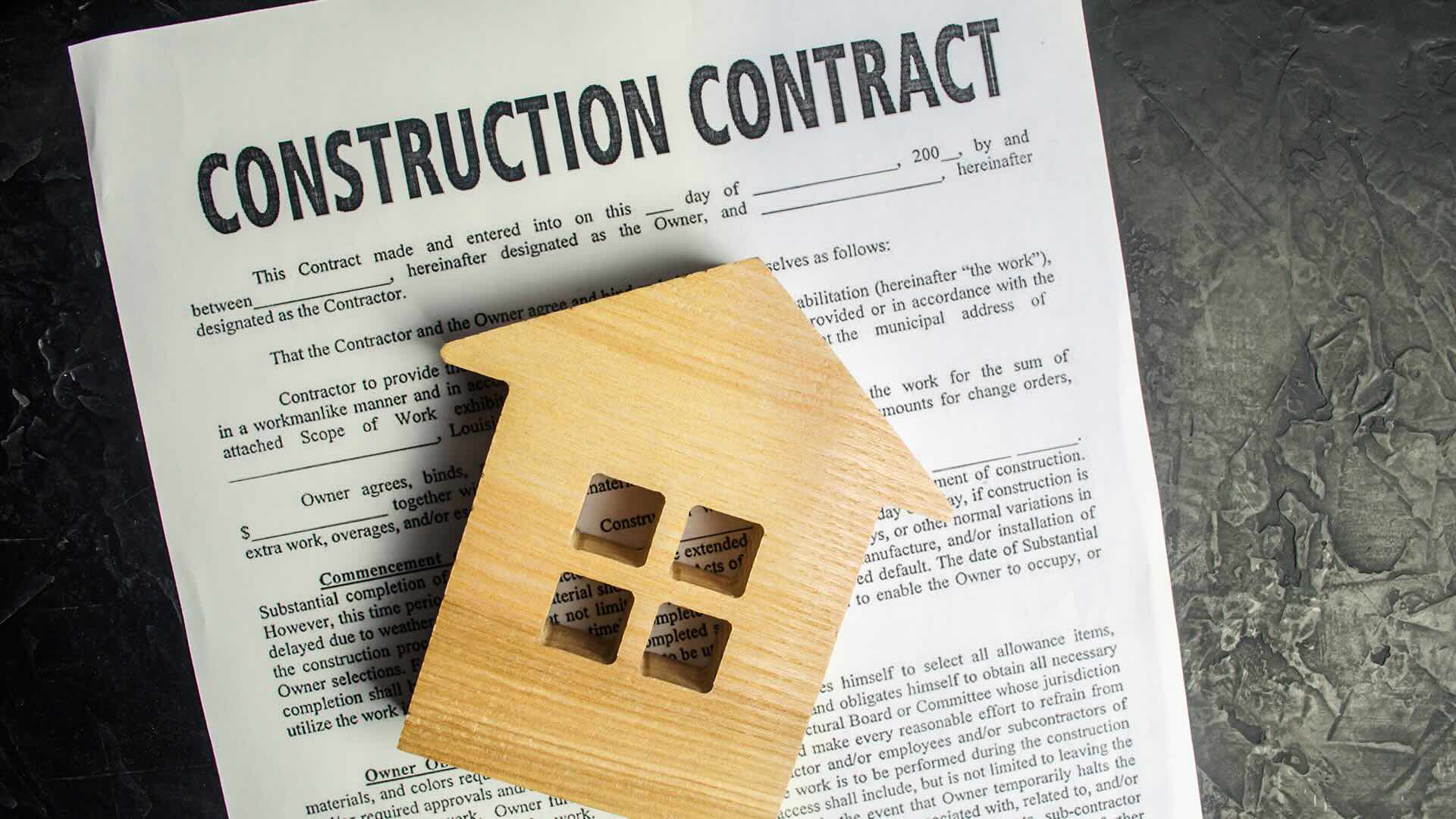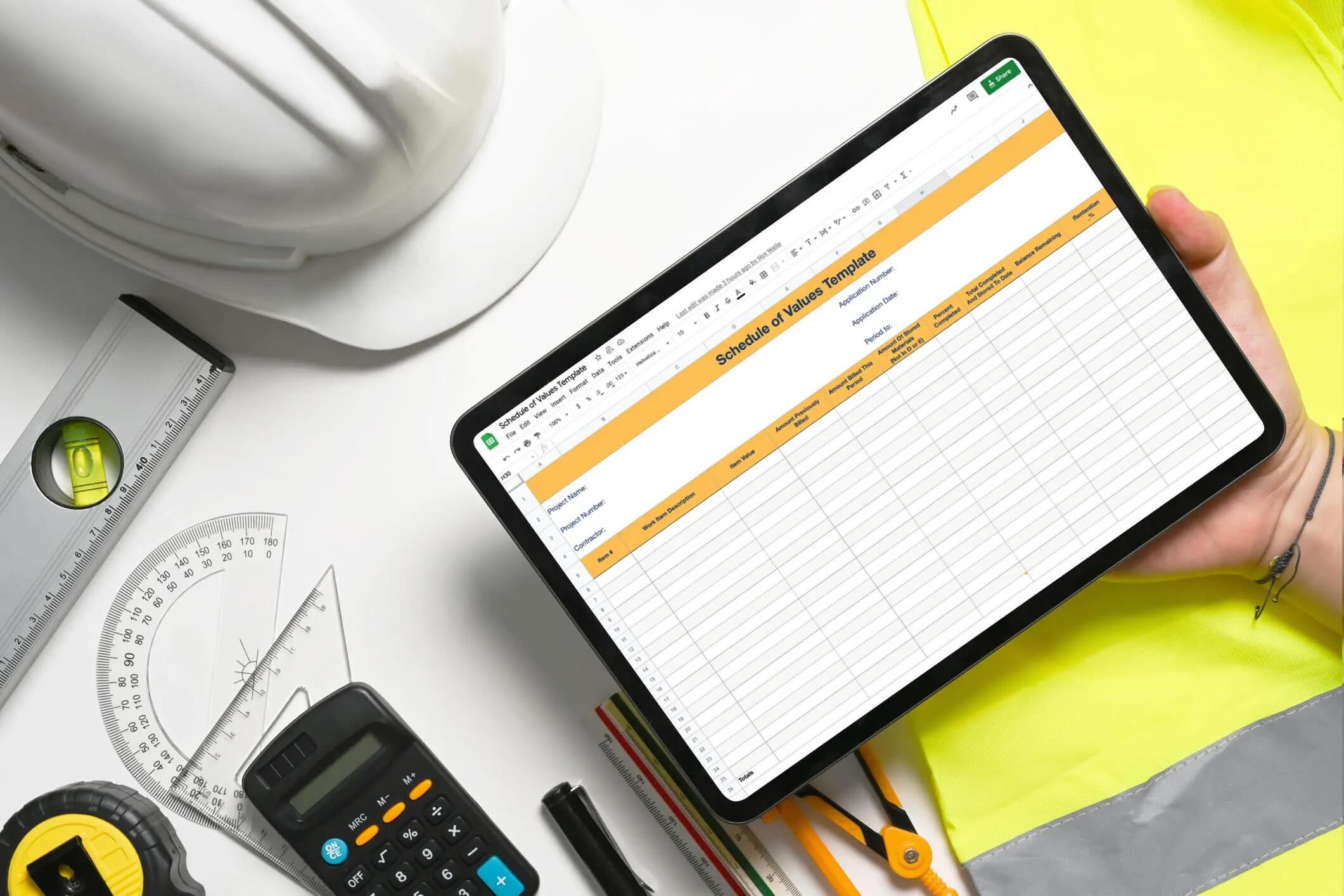Home>diy>Building & Construction>How To Get Government Construction Contracts


Building & Construction
How To Get Government Construction Contracts
Modified: March 6, 2024
Discover the secrets to winning government construction contracts with our comprehensive guide. Learn how to navigate the bidding process and secure profitable building construction projects.
(Many of the links in this article redirect to a specific reviewed product. Your purchase of these products through affiliate links helps to generate commission for Storables.com, at no extra cost. Learn more)
Introduction
Welcome to the world of government construction contracts! If you are a building construction expert looking to expand your business and take on exciting and lucrative projects, securing government contracts can be a game-changer. The government is one of the largest consumers of construction services, offering a plethora of opportunities to contractors of all sizes.
However, navigating the complex world of government contracts can be challenging. It requires a deep understanding of the procurement process, compliance with regulations, and a competitive edge to win bids against other qualified contractors. This comprehensive guide will walk you through the essential steps to successfully land and complete government construction contracts.
Before diving into the details, let’s first understand what government construction contracts are and why they hold immense potential for building construction businesses. Government contracts refer to projects issued by federal, state, or local government agencies for the construction, renovation, or maintenance of government-owned infrastructure, buildings, or facilities.
These contracts are highly sought after due to their stability and often involve larger budgets than private projects. Government construction contracts can provide a steady stream of work, ensuring a consistent flow of income for your business. Furthermore, working on government projects can enhance your reputation and open doors to new opportunities and collaborations in the industry.
However, it’s important to note that obtaining government contracts requires rigorous preparation and adherence to regulations and standards. The government procurement process is designed to ensure fairness and transparency, and contractors must meet specific criteria and demonstrate their expertise to be eligible for consideration.
In the following sections, we will delve into the key steps you need to take to position yourself as a qualified government contractor and effectively compete for and successfully execute construction projects.
Key Takeaways:
- Securing government construction contracts requires registration, certifications, and strategic bidding. It’s crucial to understand contract terms, comply with regulations, and effectively manage projects to succeed in this lucrative industry.
- Successfully navigating the process of obtaining, managing, and completing government construction contracts can elevate your business, providing stability, financial rewards, and opportunities for growth in the industry.
Understanding Government Construction Contracts
Before diving into the process of securing government construction contracts, it is crucial to have a solid understanding of the key components and nuances involved. Government contracts differ from private contracts in various aspects, from the bidding process to contractual requirements and compliance.
The first step in understanding government construction contracts is familiarizing yourself with the various types of contracts that exist. These can include fixed-price contracts, where the government pays a predetermined amount for the construction work, and cost-reimbursement contracts, where the contractor is reimbursed for the actual costs incurred, plus a fee.
Another important aspect of government contracts is the bidding process. Unlike private contracts where negotiation may play a significant role, government contracts typically follow a competitive bidding process. The bidding process involves responding to a request for proposal (RFP) or a solicitation, which outlines the project requirements, evaluation criteria, and other pertinent information.
It’s crucial to pay close attention to the RFP and ensure that your bid proposal addresses all the specified requirements. The government evaluation team will assess bids based on various criteria, such as experience and past performance, technical capabilities, and price. Understanding the evaluation process can help you tailor your bid to maximize your chances of success.
Government contracts also come with specific compliance and regulatory requirements. Depending on the type of project and funding source, you may need to adhere to labor laws, environmental regulations, safety standards, and other relevant regulations. Understanding these requirements and incorporating them into your project planning is essential to avoid costly penalties or project delays.
Additionally, government contracts may include special provisions, such as small business set-asides, which designate a percentage of contracts for small businesses. Taking advantage of these opportunities can be beneficial if your business qualifies as a small business or falls under any other designated categories.
Lastly, it’s important to note that government contracts often have longer project durations and stricter reporting and documentation requirements compared to private projects. You may need to provide progress reports, financial statements, certified payrolls, and other documentation to satisfy government auditors and ensure compliance.
By understanding the unique aspects of government construction contracts, you can prepare yourself for the specific challenges and opportunities that come with working on these projects. In the following sections, we will explore the steps you need to take to become a registered government contractor and identify contract opportunities that align with your expertise.
Registering as a Government Contractor
Before you can start bidding on government construction contracts, you will need to register as a government contractor. This process involves completing various registrations and certifications to demonstrate your eligibility and compliance with government requirements. While the specific registration requirements may vary depending on your location, there are several key steps that are generally applicable.
The first step is to obtain a unique identifier, such as a Dun & Bradstreet number (DUNS) or a Commercial and Government Entity (CAGE) code. These identifiers are used to track and identify your business when working with the government. You can obtain a DUNS number for free through the Dun & Bradstreet website, while the CAGE code can be obtained through the System for Award Management (SAM) registration process.
Next, you will need to register your business with the SAM database. SAM is a central repository where government agencies search for contractors and where you can manage your company’s information, such as contact details, capabilities, and certifications. Registering with SAM is free, and it is a crucial step for accessing government contracting opportunities.
Alongside SAM registration, you may need to complete additional certifications, depending on the type of contracts you wish to pursue. These certifications can range from small business certifications, such as the Small Business Administration’s 8(a) Business Development Program or the Women-Owned Small Business (WOSB) program, to industry-specific certifications like LEED certification for green building projects.
Completing these certifications can provide additional advantages when competing for government contracts. They can increase your business’s visibility, help you qualify for specific contract set-aside programs, and demonstrate your expertise in certain areas of construction.
Lastly, it’s important to maintain accurate and up-to-date information in your registrations and certifications. Update your SAM profile regularly with any changes to your business structure, capabilities, or contact information to ensure that government agencies have the most current information about your company.
By completing the necessary registrations and certifications, you position yourself as a qualified government contractor and gain access to a wider range of contract opportunities. In the next section, we will explore how to identify and pursue relevant government contract opportunities that align with your business’s expertise and capabilities.
Identifying Government Contract Opportunities
Once you have registered as a government contractor, the next step is to identify relevant government contract opportunities. The government offers a variety of resources and platforms to help contractors find and bid on projects that align with their expertise and capabilities.
One of the key resources is the Federal Business Opportunities (FedBizOpps) website, which serves as a central hub for government agencies to post contracting opportunities. This platform allows you to search for contracts based on various criteria, such as location, industry, and project size. It’s important to regularly monitor FedBizOpps for new opportunities and set up alerts to receive notifications for contracts that match your business’s capabilities.
In addition to FedBizOpps, consider exploring state and local government websites as they often post contracts separately. These agencies may have their own procurement processes and websites where they advertise their upcoming projects. It’s essential to research and understand the specific requirements and procedures for each agency you are interested in working with.
Networking and building relationships with government officials and other contractors can also be a valuable strategy for identifying contract opportunities. Attend industry conferences, trade shows, and government-hosted events where you can connect with key decision-makers and learn about upcoming projects. Joining industry associations and participating in business matchmaking events can also help you establish connections and stay informed about potential contract opportunities.
Another avenue for finding government contract opportunities is through subcontracting. Larger prime contractors who have secured government contracts often need subcontractors to fulfill specific aspects of the project. Building relationships with these prime contractors and positioning yourself as a reliable and capable subcontractor can lead to valuable opportunities and pave the way for future prime contracts.
Lastly, consider leveraging technology to streamline your search for government contracts. Various online platforms and databases provide comprehensive information on government projects, including historical data and forecasts. These platforms can help you identify trends, assess competition, and strategically plan your business development efforts.
By actively seeking out government contract opportunities through these channels and networking with relevant stakeholders, you increase your chances of finding projects that align with your business’s capabilities and objectives. In the next section, we will explore the essential steps for preparing a winning bid proposal to secure government construction contracts.
Preparing a Winning Bid Proposal
When it comes to securing government construction contracts, a well-prepared and compelling bid proposal is essential. A winning bid proposal demonstrates your understanding of the project requirements, your ability to deliver quality work, and your competitive pricing. Here are some key steps to follow when preparing your bid proposal.
1. Carefully review the solicitation: Start by thoroughly reviewing the solicitation documents provided by the government agency. Pay close attention to the scope of work, technical specifications, and evaluation criteria. Understand what the agency is looking for and tailor your bid to address their specific needs.
2. Develop a strong project team: Building a capable project team is crucial to showcase your expertise and capability to successfully complete the project. Highlight the qualifications and experience of your team members, emphasizing any relevant certifications or past project successes.
3. Detail your approach: Clearly outline your approach to the project and how you will meet the requirements outlined in the solicitation. Provide a detailed project plan, including timelines, milestones, and key deliverables. Explain how you will mitigate risks and ensure quality control throughout the construction process.
4. Demonstrate past performance: Government agencies highly value past performance as an indicator of a contractor’s ability to deliver on their promises. Provide examples of similar projects you have successfully completed, emphasizing any government contracts or projects with similar requirements.
5. Include a thorough cost estimate: Prepare a comprehensive and accurate cost estimate for the project. Break down the costs into various categories, such as labor, materials, subcontractors, permits, and overhead expenses. Ensure that your pricing is competitive while still allowing for a reasonable profit margin.
6. Highlight your unique selling proposition: Differentiate yourself from the competition by highlighting your unique strengths and capabilities. Showcase any innovative approaches, sustainable practices, or specialized expertise that sets you apart from other bidders. This can give you a competitive edge and increase your chances of success.
7. Compose a persuasive executive summary: Craft a compelling executive summary that highlights the key points of your bid proposal. Summarize your understanding of the project, your qualifications, your approach, and your pricing in a clear and concise manner. This section should catch the attention of the evaluating team and leave a lasting impression.
8. Proofread and review: Before submitting your bid proposal, thoroughly proofread and review it for any errors or inconsistencies. Check that all the necessary documents and forms are included and properly filled out. A well-presented and error-free bid proposal demonstrates professionalism and attention to detail.
Remember, every bid proposal should be carefully tailored to each specific project and agency’s requirements. Make sure to submit your bid before the deadline and follow any specific submission instructions outlined in the solicitation.
By investing time and effort into preparing a winning bid proposal, you increase your chances of securing government construction contracts and growing your business. In the next section, we will explore the importance of meeting contract requirements and regulations once you have been awarded a government construction contract.
Research and understand the specific requirements and regulations for government construction contracts. This may include certifications, bonding, and compliance with prevailing wage laws.
Read more: How To Get Contracts For Construction
Meeting Contract Requirements and Regulations
Once you have successfully secured a government construction contract, it is crucial to understand and comply with the contract requirements and regulations. Government contracts come with specific obligations, standards, and regulatory frameworks that must be followed to ensure project success and avoid penalties or legal issues. Here are key steps to meet contract requirements and regulations:
1. Understand the contract terms: Thoroughly review the contract to understand the scope of work, project timelines, deliverables, and milestones. Pay attention to any special provisions, requirements, or performance standards outlined in the contract. Clear understanding of the terms will help you plan and execute the project effectively.
2. Establish effective communication: Maintain open and regular communication with the contracting agency throughout the project. Understand who the primary contact person is and establish a communication protocol to address any questions, concerns, or changes that may arise during the construction process. Effective communication ensures smooth project coordination and helps build a strong working relationship.
3. Adhere to project timelines and milestones: Timely project completion is essential in government contracts. Develop a detailed project schedule and monitor progress closely to ensure that you meet the specified timelines and milestones. Failure to comply with project schedules can result in financial penalties or contract termination.
4. Comply with regulatory requirements: Government construction contracts often involve compliance with various regulations and standards. These can include labor laws, safety regulations, environmental standards, and more. Stay updated on the specific requirements applicable to your project and ensure compliance throughout the construction process. Regularly assess and mitigate any potential risks associated with non-compliance.
5. Maintain accurate documentation: Accurate and thorough documentation is critical in government contracts. Keep detailed records of all project-related activities, including daily logs, progress reports, change orders, correspondence, and financial records. Maintain proper accounting practices and provide any required financial statements or certified payroll reports as per the contract requirements.
6. Monitor subcontractor performance: If you choose to subcontract certain aspects of the project, closely monitor their performance to ensure they adhere to the contract terms and comply with regulations. Subcontractors must meet the same standards and requirements as specified in the prime contract. Regularly review their progress and address any issues promptly to maintain project quality and schedule.
7. Seek necessary approvals and permits: Depending on the project scope and location, you may need to secure permits, licenses, or approvals from relevant authorities. Familiarize yourself with the permit requirements and ensure timely acquisition to avoid project delays or non-compliance.
8. Conduct quality control and assurance: Implement an effective quality control and assurance plan to ensure that the construction work meets the specified standards and specifications. Regularly inspect the work, update quality documentation, and address any deficiencies promptly to maintain the required level of quality throughout the project.
By closely adhering to contract requirements and regulations, you demonstrate your commitment to delivering a successful project and build a positive reputation with the government agency. Proper compliance ensures long-term success in securing future government construction contracts.
In the next section, we will discuss the crucial steps involved in negotiating and securing government construction contracts.
Negotiating and Securing Government Construction Contracts
Securing government construction contracts often involves a negotiation process to reach an agreement that is favorable to both parties. Here are key steps to help you navigate the negotiation process and successfully secure government contracts:
1. Review the contract terms: Thoroughly review the contract terms and understand your rights and obligations. Identify any clauses that may require negotiation or clarification. Prepare a list of possible areas for negotiation, such as project timelines, payment terms, change order procedures, or dispute resolution mechanisms.
2. Identify areas of mutual benefit: Consider potential areas where both parties can benefit from adjustments or concessions. This could involve proposing alternative approaches, value engineering options, or schedule optimizations that can save costs or accelerate project completion. Identifying mutually beneficial solutions can help facilitate the negotiation process.
3. Assess your leverage: Evaluate your bargaining power by considering factors such as your company’s expertise, past performance, competitive pricing, and the agency’s need for the project. Understanding your leverage can guide your negotiation strategy and help you present your value proposition effectively.
4. Prepare a negotiation strategy: Develop a negotiation plan that outlines your objectives, potential concessions, and fallback positions. Anticipate the agency’s concerns or objections and prepare counterarguments or alternative solutions. Be flexible and open to compromises while still ensuring you protect your business interests.
5. Engage in open and constructive communication: Foster a positive and collaborative atmosphere during the negotiation process. Clearly communicate your needs and concerns while actively listening to the agency’s perspective. Ask questions and seek clarification to ensure a mutual understanding of expectations and requirements.
6. Document any agreed-upon changes: As negotiations progress, document all agreed-upon changes or modifications to the contract terms. Ensure that these changes are properly incorporated into the final contract document to avoid any misunderstandings or disputes down the line. Seek legal advice if necessary to ensure the contract accurately reflects the negotiated terms.
7. Prepare a comprehensive proposal: Once the negotiation process is complete and the contract terms are agreed upon, prepare a comprehensive proposal that clearly outlines the scope of work, project schedule, pricing, and any other relevant details. Pay attention to detail and ensure that the proposal addresses all the requirements outlined by the agency.
8. Submit the proposal timely: Adhere to the submission deadline stipulated in the solicitation and follow any specific submission requirements. Double-check that all necessary documents, forms, and supporting materials are included. A timely and complete proposal demonstrates professionalism and commitment.
Securing government construction contracts requires patience, strategic negotiation, and effective communication. By approaching negotiations with a collaborative mindset and ensuring the contract terms align with your business goals, you can create a solid foundation for a successful project partnership. In the next section, we will explore the key steps involved in managing and completing government construction projects.
Managing and Completing Government Construction Projects
Managing and completing government construction projects requires careful planning, effective project management, and strong coordination with all stakeholders involved. Here are key steps to ensure a successful execution of government construction projects:
1. Develop a comprehensive project plan: Create a detailed project plan that outlines the specific tasks, timelines, and responsibilities for each phase of the construction project. Consider all aspects, including procurement, resource allocation, risk management, and quality control. Ensure that your plan reflects the requirements outlined in the contract and any applicable regulations.
2. Assign a dedicated project team: Assemble a team of qualified professionals who will oversee and execute the project. Clearly communicate roles and responsibilities, establish lines of communication, and foster a collaborative environment. Regularly engage with the team to monitor progress, address challenges, and facilitate effective decision-making.
3. Implement robust project management practices: Utilize established project management methodologies to track and monitor progress, manage resources, and mitigate risks. Employ a reliable project management system or software to streamline communication, document sharing, and progress reporting. Regularly analyze project performance and make necessary adjustments to ensure project objectives are met.
4. Communicate and collaborate with stakeholders: Maintain open and transparent communication with all project stakeholders, including the government agency, subcontractors, suppliers, and the local community, where applicable. Provide regular updates on project milestones, address concerns promptly, and seek feedback to ensure alignment with expectations and regulations.
5. Adhere to quality control and safety standards: Implement a robust quality control program to ensure that the construction work meets the required standards and specifications. Regularly inspect the work, conduct quality audits, and address any non-conformities promptly. Prioritize safety by adhering to occupational health and safety regulations and maintaining a safe working environment for all personnel involved in the project.
6. Monitor project finances and documentation: Maintain accurate and up-to-date financial records, including project costs, expenditures, and invoicing. Regularly review financial reports to monitor project profitability and ensure compliance with contract terms. Maintain proper documentation of all project-related activities, including change orders, permits, inspections, and any other necessary records.
7. Proactively manage project risks: Identify potential risks and develop strategies to mitigate them proactively. Continually assess risks throughout the project lifecycle and implement necessary controls to minimize their impact. Be prepared to address unforeseen challenges that may arise during the construction process.
8. Regularly communicate with the government agency: Maintain regular communication with the government agency overseeing the project. Provide progress reports, attend progress meetings, and address any concerns or requests for information promptly. Building a strong working relationship with the agency fosters trust and collaboration.
9. Regularly assess and adjust the project schedule: Continually monitor the project schedule and proactively address any delays or issues that may arise. Stay in close communication with subcontractors and suppliers to ensure timely delivery of materials and completion of their assigned tasks. Regularly communicate any changes to the schedule with the government agency and other stakeholders affected by the adjustments.
By effectively managing and completing government construction projects, you demonstrate your professionalism, capability, and commitment to project success. Successfully completing government projects can enhance your reputation, build credibility, and open doors to future contracting opportunities. In the concluding section, we will provide a summary of the important points discussed and emphasize the significance of government construction contracts.
Conclusion
Securing government construction contracts can be a game-changer for building construction businesses. These contracts offer stability, larger budgets, and the opportunity to showcase your expertise in the industry. However, navigating the intricacies of government contracts requires a deep understanding of the procurement process, compliance with regulations, and effective project management.
In this comprehensive guide, we have covered the essential steps to successfully obtain and complete government construction contracts. It begins with registering as a government contractor, obtaining unique identifiers, and completing necessary certifications. By positioning yourself as a qualified contractor, you gain access to various government contract opportunities.
Identifying government contract opportunities involves utilizing resources such as the Federal Business Opportunities (FedBizOpps) website, state and local government websites, networking, and subcontracting. These methods help you stay informed about projects that align with your expertise and capabilities.
Preparing a winning bid proposal is crucial to stand out from the competition. You need to thoroughly review the solicitation documents, develop a strong project team, detail your approach, and demonstrate past performance. Crafting a persuasive executive summary and submitting a complete and accurate bid proposal are vital for success.
Once you secure a government contract, meeting contract requirements and regulations play a pivotal role. It includes understanding the contract terms, adhering to regulatory requirements, maintaining accurate documentation, and effectively managing subcontractors.
Negotiating and securing government construction contracts require strategic planning and open communication. Reviewing the contract terms, identifying areas of mutual benefit, and effectively documenting changes are key steps to ensure a favorable agreement.
Managing and completing government construction projects demands effective project management, adherence to quality control and safety standards, strong stakeholder communication, and proactive risk management. Monitoring project finances, adjusting schedules, and maintaining a collaborative relationship with the government agency are also imperative.
By successfully navigating the process of obtaining, managing, and completing government construction contracts, you can elevate your business to new heights. These contracts not only provide stability and financial rewards but also enhance your reputation and open doors to further opportunities in the industry.
Remember, each government project is unique, and it’s essential to adapt and learn from each experience to continuously improve your capabilities as a government contractor. Stay updated on evolving regulations, industry trends, and emerging technologies to stay competitive in the government contracting arena.
Now that you have a better understanding of the steps involved, seize the opportunities, and embark on a successful journey of securing and completing government construction contracts. Good luck!
Frequently Asked Questions about How To Get Government Construction Contracts
Was this page helpful?
At Storables.com, we guarantee accurate and reliable information. Our content, validated by Expert Board Contributors, is crafted following stringent Editorial Policies. We're committed to providing you with well-researched, expert-backed insights for all your informational needs.















0 thoughts on “How To Get Government Construction Contracts”